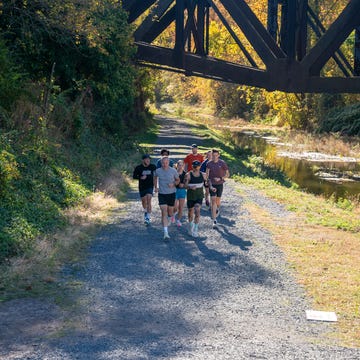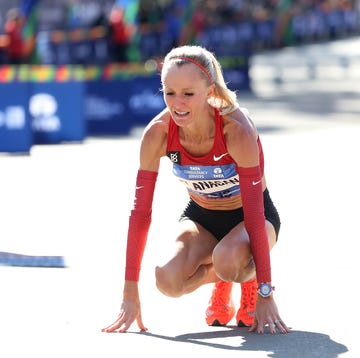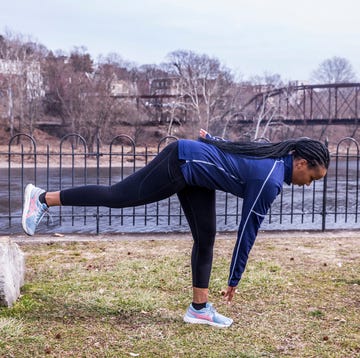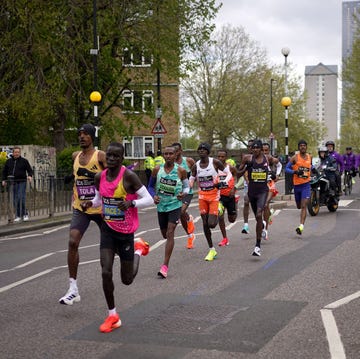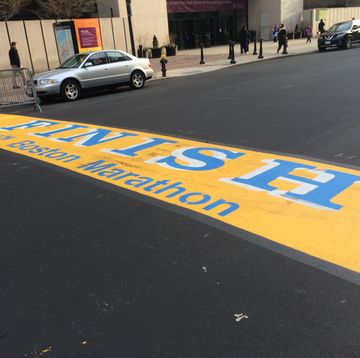Jenny Kyle never expected to be knocked off her stride by a cat.
Nine days before the 2013 Gate River Run last March, the national 15K in Jacksonville, Fla., Kyle volunteered at the Humane Society in her hometown of Savannah, Ga. While she was working there, a cat bit her on the hand. The wound turned red and swelled up to her elbow. Kyle contracted cellulitis and spent five days in a hospital receiving intravenous antibiotics.
Weak from the hospitalization and still on medication after her release, Kyle, now 64 (who holds three age records for the Gate River Run), walked and jogged the 5K rather than the 15K four days later.
Since 2010, Kyle, a native of Manchester, England, has dealt with two other major injuries. Far worse, she lost her husband, Dave, after a five-year battle with colon cancer. On Oct. 30, 2010, four days before his death, she ran 43:41 in a 10K. A month earlier, she had clocked 20:32 in the YMCA Heart of Savannah 5K, which ranked her No. 3 by Running Times that year among road racers in the female 60–64 age division.
She was competing at a high level, but because of her husband’s illness, Kyle says she wasn’t eating properly and getting enough rest. Shortly after his death, she was spent emotionally. Her training ceased for several months.
Then the injuries started. She awoke one night in 2011 with severe pain in her knee and had to have arthroscopic surgery to repair a torn meniscus. During a run in the rain on Memorial Day in 2012, she stepped in what she thought was a puddle. It was a deep pothole, and she broke a bone in her foot. Then the cat bite. “Every time I’ve come back from an injury, something’s happened,” she says.
It’s been a rough stretch for an athlete who had been racing for 35 years. Dave, a high school cross country runner in England, had encouraged her to run after they immigrated to the U.S. in 1976. He told her that if she ran a two-mile race under 16 minutes, he would buy her a pair of running shoes. At age 29, she ran 15:02 in her first race. Soon, she started beating him. “It surprised me how good I was,” Kyle says.
In 2013, Kyle finally returned to consistent training, albeit slower than she had been in 2010. After both injuries, she alternated walking and running on an Alter-G anti-gravity treadmill and jogged in a pool several times a week to maintain her fitness. Unless she’s recovering from an injury, Kyle says she loathes running on a treadmill. “I've run at minus-23 degrees and 110 degrees,” she says. “The only thing that stops me from being outside is lightning.”
Before the onset of her injuries, Kyle’s favorite interval workout was a 1.42-mile loop on the synthetic surface at Lake Mayer, a public park in Savannah. There she did three one-mile repeats at 6:35 pace with a half-mile jog between in 4 minutes. A recent workout included a warm-up mile in 8:45, followed by three separate loops at Lake Mayer at 7:45 pace with a minute rest between. “I don't like to do speed work on a track because of the bend; I prefer to do it somewhere straighter," she says.
Her hill training consists of an eight-mile run both ways over the 1.4-mile span of the Talmadge Bridge in Savannah, which has a 5.5 percent grade in an otherwise flat coastal city. Her group runs it at 7 a.m. Sunday morning in light traffic. She remembers hearing Frank Shorter give a lecture in Boulder, Colo., suggesting that if you're recovering from an injury and don't like speed work, the next best thing is hill work. "You shorten your stride and lift your knees more,” she says about attacking hills.
In addition to a five-day running schedule, Kyle devotes Mondays to 45 minutes of circuit training at a gym for upper body and abdominal work. She also stretches and does core exercises, including crunches and pushups, six days a week to prevent injury.
Until July 2012, Kyle trained around her busy fulltime job, supervising a staff of nine as the chief radiation therapist at Savannah’s Anderson Cancer Institute. She has since cut her work schedule to three days but hasn’t changed her training except for running some days early in the morning, which she wasn’t able to do when she was working fulltime.
In her first real test after the cat bite, she ran 22:15 for a 5K last May. She committed last July to run November’s Savannah Rock 'n' Roll Marathon, her first marathon in more than 12 years. Her weekly mileage peaked at 50, and her longest training run was 22 miles at 9:00 pace. “My head will be better if I run close (to marathon distance),” she said before the race. On most training days, the slender 5-foot-3, 107-pound woman with an economical stride puts in a mini-tempo run. On a recent 6.5-mile run, she went from a 9:00 to a 7:45 pace in the last two miles.
Kyle's primary goal for the Savannah marathon was "to get through it and enjoy it," but she also wanted to see how far below four hours she could dip. She completed it in 3:50:48, setting a Georgia record in the female 60–64 division.
Kyle admits that he hasn’t returned to her performance level from three years ago and doesn’t know if it’s possible. But she’s not discouraged. “Running for me has always been a fun thing, not to be taken too seriously even though I am competitive,” she says. Healthy again, she’ll concentrate on shorter races—and steer clear of unfamiliar cats and potholes.
Training Regimen
Sept. 28-Oct. 11 in preparation for the Savannah Rock ’n’ Roll Marathon on Nov. 9
Saturday: 20.5 miles at 9:00 pace
Sunday: 7 Mile: 5:20, 1982
Monday: Jenny Kyle recovers from serious injuries and the death of her husband
Tuesday: 6.5 miles, last two miles at 8:00 pace, last half mile at 7:45 pace
Wednesday: 6.5 Jenny Kyle recovers from serious injuries and the death of her husband
Thursday: 7 miles at 9:00 pace
Friday: Rest
Oct. 5-11
Saturday: 15 miles at 9:00 pace
Sunday: 7.5 Jenny Kyle recovers from serious injuries and the death of her husband
Monday, Tuesday: Same as previous week
Wednesday: 6 Jenny Kyle recovers from serious injuries and the death of her husband
Thursday: 6 K: 17:32, 1982
Friday: Rest
Personal Records
Mile: 5:20, 1982
5How to Better Pace a Marathon Based on Effort
10K: 35:10, 1982
How to Run Twice a Day Without Injury
Advertisement - Continue Reading Below
Stats
Beginner Running Gear
miles, last two miles at 8:00 pace, last half mile at 7:45 pace.



